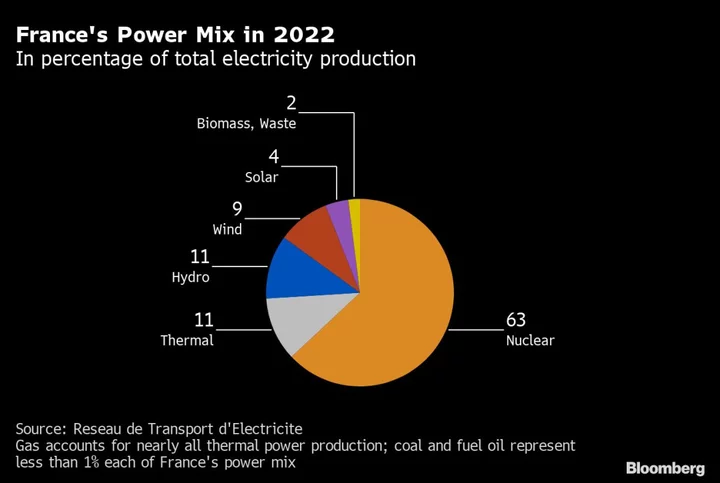European Union countries reached an agreement on an overhaul of the bloc’s power market after Germany and France broke a deadlock on how to treat nuclear power that had been holding back progress for months.
It means that member states can now enter talks with the European Parliament over the final shape of the deal, boosting the likelihood that it will be in place before regional elections in June, and potentially even by the end of the year. All countries backed the deal except Hungary.
The agreement was brokered after Germany backed a compromise allowing France to provide subsidies to prolong the life of its existing nuclear reactors, but with restrictions to prevent an unfair advantage for its industry. The French energy minister was quick to point out that Tuesday’s deal should be preserved in next-step negotiations with the parliament.
“It’s a compromise which sets out a balance and we need to make sure we keep to it,” said Agnes Pannier-Runacher, France’s minister for the energy transition. “It allows member states room for manoeuvre and to take action on the basis of their own energy mix.
An agreement is seen as vital to accelerating the roll out of renewables and weakening the role of gas in setting European power prices, which roiled the bloc last year after Russia’s invasion of Ukraine.
Still, the last few months have shown that there are still large differences between how countries see the role of nuclear power in the climate transition.
The compromise found by Spain, which holds the rotating presidency of the bloc, brought back under power market rules state support for existing nuclear facilities using so-called contracts for difference.
The move to bring Germany on-side, means that any subsidies provided by the French government to state-owned Electricite de France SA would be subject to strict controls on how revenues from power are distributed, so that electricity prices in other member states aren’t undercut.
“Europe has demonstrated its ability to act,” said German economy minister Robert Habeck. “The agreement improves access for consumers and industry to low electricity prices across Europe.”
Poland managed to broker a carve-out so that its coal-fired plants can receive subsidies to provide backup power during the transition until 2028.
Kadri Simson, the EU’s energy commissioner, said that the institution would also apply “rigorous” state-aid control to any subsidies provided.
Three-way talks between the European Council, the Commission, and the Parliament will begin on Thursday with negotiations to be concluded before the end of the year, Spain’s Environmental Transition Minister Teresa Ribera said.
--With assistance from Ewa Krukowska.
(Updates with German minister quote in ninth paragraph.)

